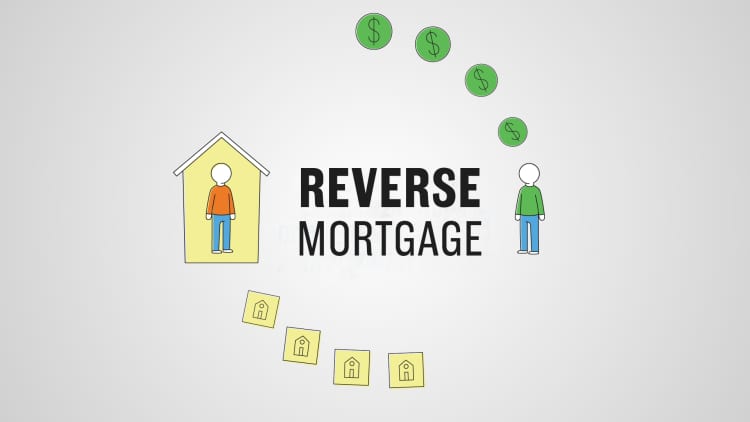
You don't have to be old, poor and stupid to get a reverse mortgage.
Despite still being hawked on late-night infomercials along with miracle solvents, indispensable kitchen utensils and can't-fail weight-loss programs, reverse mortgages are becoming an increasingly popular and practical product for Americans who need income in retirement.
"Those late-night ads are a really bad idea for the industry," said John Salter, a certified financial planner with Evensky & Katz/Foldes Financial and an associate professor at Texas Tech University.
Salter sees reverse mortgages, despite their less-than-stellar reputation, as a valuable tool for retirement planning. They can help older Americans stay in their homes during retirement, they can reduce expenses that might otherwise exhaust retirees' financial resources, and they offer greater flexibility than traditional mortgages or home-equity loans for borrowers.
"People have to focus on what their retirement goals are, and including home equity in the equation can make things a lot better," Salter said.
For most seniors, home equity represents a significant and largely untapped proportion of their wealth in retirement. Although reverse mortgages have traditionally been seen as a last resort for retirees who've exhausted their other assets, they are a very flexible product that can help reduce living expenses and preserve other assets for the future.
"Reverse mortgages are a great way to transfer debt on a house from a current expense to a future liability," said Mark Cortazzo, a
They are also particularly attractive in a low-interest-rate environment.
"They are the one retirement tool that benefits from
More from FA Playbook:
Retirement saving remains a challenge for many women
What Trump's economic agenda means to you
Will students with student debt benefit under Trump?
Here's how reverse mortgages work:
If you're at least 62 years old, own your home outright (or have a low existing mortgage balance) and have enough financial resources to continue paying property fees such as taxes and insurance, you're eligible for a reverse mortgage guaranteed by the Federal Housing Administration. You can use the reverse mortgage to pay off that existing low mortgage balance, other debt or even the cost of a new home.
Homeowners are responsible for paying property taxes, home insurance and maintenance costs on the property. You can receive a lump sum or a monthly stream of payments up to a principal limit negotiated at the outset of the contract. That limit is based on the value of your home, expected mortality rates, the lender's profit margin and prevailing interest rates.
The line of credit reverse mortgage is a popular option for senior borrowers when choosing how to access their funds with their reverse mortgage. Borrowers have the option to set up a line of credit that grows at a rate dependent on the lender's margin, the annual FHA insurance
Unlike traditional mortgages or home equity loans, the borrower does not make regular payments of principal and interest on the loan. Instead, the lender makes their money on the back end when homeowners either die or sell their home, at which point the loan has to be repaid.
Reverse mortgages can enable people to spend more than they should, and accelerate the path to asset depletion.Wade Pfaudirector of retirement research at McLean Asset Management
Homeowners can never be kicked out of their house, regardless of how long they live (as long as you pay taxes, insurance and maintenance), nor will their beneficiaries be on the hook for more than its market value. If the home value is ultimately less than the balance owed, the difference is covered by the FHA insurance fund.
The criticism of reverse mortgages is less with the product itself than with the way that people use them. "Free money" has a tendency to encourage bad behavior — one reason the Federal Housing Administration requires borrowers to undergo a counseling session before entering a reverse mortgage contract. In other words, don't use a lump-sum payment from one of these to buy the Mercedes-Benz you've always wanted. "Reverse mortgages can enable people to spend more than they should and accelerate the path to asset depletion," said Pfau.
The reverse mortgage is not for everyone. Origination and closing costs are typically higher than other alternatives, and if you have ample financial assets, the extra liquidity a reverse mortgage offers is probably not worth the cost. However, if maintaining a decent quality of life in retirement is a major concern, then the product could be a valuable option.
Here are the major pros and cons of reverse mortgages:
Pros
- A reverse mortgage is a non-recourse loan. Lenders cannot change the terms nor demand repayment of the loan prior to your death or the sale of your home, regardless of what happens in the market or with your own financial situation.
- Homeowners can receive a lump-sum payment or a stream of income over an extended period, or they can set up a line of credit to access now or in the future if needed. This can dramatically reduce current living expenses, and borrowers can pay off the loan without penalty or pay it down and still maintain a line of credit.
- The reverse mortgage allows borrowers to keep an investment portfolio intact and producing returns. That can be particularly valuable after downturns in the financial markets. They can also help avoid adverse tax consequences. "If a person has most of their assets in 401(k) plans or IRAs, paying off a $300,000 mortgage could cost them $450,000 or more depending on what state they live in," said Cortazzo of Macro Consulting Group.
- With interest rates so low, the terms for reverse mortgages are particularly attractive now.
Cons
- Reverse mortgages are debt, and they have to be repaid. That can be a burden on borrowers and will reduce the legacy benefits to heirs.
- The seeming windfall of a reverse mortgage can lead to irresponsible spending by retirees and a more rapid depletion of financial assets.
- Homeowners are required to pay property taxes, insurance and maintenance costs of the property. If they don't, they could face default and have to leave the house. You cannot have any other mortgages on the property before getting a reverse mortgage.
- Reverse mortgages cost more than traditional mortgages and home-equity loans, with typically high loan origination and closing costs. If you end up staying in your home for a short period, the cost can end up being very high compared to the benefit.
- The terms of reverse mortgages vary widely in the industry. Borrowers need to educate themselves on the product and shop around for the best deal.
Correction: This story was updated to reflect that you are eligible to have a reverse mortgage, even if a small mortgage still exists on your home.




